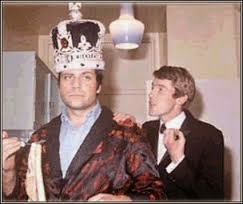Starring John Mills, Anthony Quayle, Sylvia Simms and Harry Andrews
Directed by J. Lee Thompson
Set in 1943 in North Africa at the height of the Second World War, and based on the novel by Christopher Landon, the film follows the crew of an Ambulance, nick-named Katy, heading from Tobruk towards the hospital in Alexandria, carrying a pair of nurses. Led by Captain Anson, played with typically dependable stoicism by the great John Mills, the crew faces a variety of tribulations on their journey. Anson is a recovering alcoholic, and clearly under huge pressure. Mills' performance is a triumph, as he struggles to keep a lid on his internal turmoil. The title refers to a cold beer he has promised himself when they eventually reach Alexandria. The crew is rounded out by Sylvia Simms as nurse Sister Diana Murdoch, Anthony Quayle as South African officer Captain van der Poel, and the ever-reliable Harry Andrews as M.S.M Tom Pugh. This is a very tight and striking four hander; it's a cast to die for, and the performances are uniformly strong. It's the first time I've included more than two stars at the header for this piece, because it really is impossible to separate the four of them. One of the best ensemble casts - albeit a small one - ever.
The plot is by its very nature episodic, but it's engaging and exciting. It's stirring stuff. Incidents along the way include frequent mechanical problems with the old ambulance, a perilous trip through a soft-sanded region, a desperate attempt to make it up a steep slope of a sandy hill, attacks by Stuka dive-bombers, a nerve-jangling minefield crossing, and encounters with German troops in the region - van der Poel is a German speaker and twice manages to secure the crew's freedom to press onwards. He's very macho, somewhat aloof, but big and strong, and proves to save the team on several occasions. But midway through the film, the rest of the crew begin to have suspicions that something is amiss, and that he's not entirely what he claims to be. But they need to stick together to stay alive, even though the seeds of discord have been sown. It means that they need to place their faith in him despite their doubts. It adds to the power that makes this film more than just an adventure story, but a brilliant human drama. There's a hint of romance between Simms and Mills, but it's never over-played. There's one moment, and only one, where Mills explodes with rage and frustration. It's brilliantly played, utterly believable, and only serves to highlight the control and leadership he otherwise shows.
Technically, the film is second to none, particularly given when it was produced, and the type of pictures which proliferated at the time. Shot in stark black and white, the cinematography is outstanding, crisp and clear. The directing choices are memorable too. In particular, Thompson deploys a technique whereby he contrasts the stark desert landscapes in wide, wide shots, the ambulance appearing as a tiny creature in the wilderness, with tight, claustrophobic moments in the back of the ambulance, featuring an abundance of close-ups. Pace-wise, the film is not typical of the average WW2 drama / adventure. Whilst the plot constantly feels like it's moving forward, some scenes are incredibly drawn out for reasons of tension - in particular the minefield cross, and the sandy hill climb. This makes the film stand out from many others in the same genre. The score is full of bombastic Military march style music very reminiscent of the period, but another thing to make the film memorable is that for long periods it is soundless, perhaps in reference to the desolate nature of the surroundings. Characters will simply interact without speaking, or, for instance, a dying character will whisper so softly that we can't hear anything, and the soundtrack doesn't offer up sweeping emotional music.
At the climax, for which I don't feel obliged to say this a spoiler, the crew arrive in Alexandria and head to the bar to partake in the aforementioned ice cold beer. Anson orders the barman to line them up, and there follows a fantastic moment of silent reflection, as he stares at the glass, with an almost sexual lustre. After everything they've been through, they made it, and this is his prize. He contemplates the glass, and traces his finger down its condensated side. It's one of the many moments that make this film iconic, in the truest sense of the word. I believe it was even used as a beer advert in the 1980s! There's a brilliant, tense moment in this scene involving van der Poel's dog-tags, but I'll let you see the movie for yourself and enjoy the moment - not exactly a "twist", but close to one.
It's fair to say that this is a bona fide classic in just about every sense of the word. It's one of the best Second World War films ever made, it's one of the best adventure / "guys on a mission" films ever made, it's one of the most hauntingly beautiful films ever made, and one of the best character pieces ever done. Little details stand out... such as the beads of sweat on Sylvia Simms' cheeks in one scene, or indeed a moment when she will just look at another character and offer up a wistful smile. Whether you're interested in the adventure or the characters, "Ice Cold in Alex" will prove to be one of the most rewarding and memorable filmic experiences you have. Expertly directed by J. Lee Thompson, who did the original "Cape Fear" with Robert Mitchum, and a couple of "Planet of the Apes" movies, the film is remarkably solid and enjoyable. Cannot rate highly enough.
SB















































